#Mini python projects
Explore tagged Tumblr posts
Text
Unique Python Projects for engineering students
Welcome to the world of Python projects with Takeoff Edu Group! Here, we use Python, which is a popular language for making all kinds of cool stuff. Whether you're just starting to learn to code or you've been doing it for a while, Python is a great choice. You can use it to create websites, smart programs, and much more. In our collection of projects, you'll find lots of different ways to use Python to solve real problems. There are tons of tools and tricks in Python that you can explore to make your projects awesome. So, let's dive in together with Takeoff Edu Group and see all the amazing things we can do with Python!
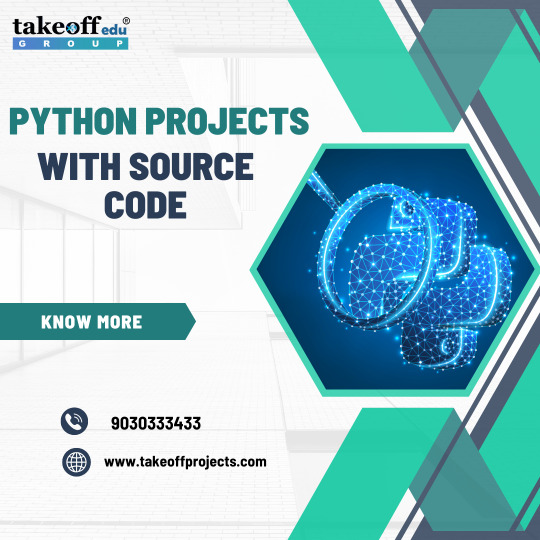
Takeoff edu Group Titles of Python Projects
Latest:
Discovering Knee Osteoarthritis using CNN enhanced With Alex Net
Machine Learning Model For Prediction of Smartphone Addiction
Medical Insurance Premium Prediction with Machine Learning
Web Based Book Recommendation System using Collaborative Filtering
Trendy:
Glaucoma Detection Using Fundus Images Of The Eye
Detection of Phishing Attacks - A Machine Learning Approach
Classification of Google-Play-Store Apps using SVM and KNN Classifiers
Hand Written Digit Recognition using Machine Learning
Standard:
Image DC: Image Data Cleaning Framework Based on Deep Learning
Design And Implementation Of Brain Tumor Detection
Designing Disease Prediction Model Using ML Approach
Identity-Based Data Outsourcing Using Proxy Auditing In Clouds
End-to-End Speech Emotion Recognition with Gender Information.
Python projects can be broadly categorized under a wide range of uses that mirror the applicability and popularity of the language in various fields. From web development to data analysis and machine learning, automation, among other things, the Python ecosystem is a versatile platform for innovative problem-solving. Many web development projects currently make use of frameworks such as Django or Flask so that one can overcome scalability and security issues with ease. On the data science and analytics front, Python's vast ecosystem of libraries like NumPy, pandas and Matplotlib play quite a helpful role as they help in efficient data manipulation, exploration, and visualization Moreover, Python forms an essential component of automation projects as its ability to generate scripts and tools for automation of repetitive jobs and boosting efficiency stands out. Whatever is creating a dynamic website, using a big data set, building smart programs, or automating tasks, developers from all over the world prefer to use Python as a programming language for the reason that it offers unimaginable possibilities of innovation and impact.
The above Python Projects Titles are the example of Takeoff edu Group. Here Takeoff edu Group not only provide Python projects but also furnishes all kind of projects with proper guidance and support.
#Python projects#Mini python projects#Python project#Beginner python project#Python for beginners#Best python projects#Python mini projects
0 notes
Text
SUSTAINABLE PRACTICES AND TOURISM DEVELOPMENT AT THE NATIONAL MUSEUM IBADAN AS A STUDY AREA
SUSTAINABLE PRACTICES AND TOURISM DEVELOPMENT AT THE NATIONAL MUSEUM IBADAN AS A STUDY AREA ABSTRACT This research explores the role of sustainable practices in tourism development, with a focus on the National Museum Ibadan, Nigeria. The study investigates the current sustainable practices at the museum, their impact on tourism development, the challenges faced in integrating sustainability, and…
#ai ml project topics#ai project topics for final year#any project topics#bank related project topics#banking related topics for project#bba 5th sem project topics#be project topics for computer engineering#best marketing project topics#best marketing topics for project#best research project topics#best topics for project report#bible project topics#biblical and theological project topics#brand awareness project topics#business ethics project topics#business research project topics#case study topics for project management#climate change project topics#computer science project topics in python#computer science project topics on web design#dbms mini project topics using sql#dbms project topics using sql#design thinking project topics#diversity project topics#easy marketing topics for project#examples of project proposal topics#finance internship project topics for mba#financial risk management project topics#good research project topics#good science project topics
0 notes
Text








Excalibur (1981) | Directed by John Boorman
Arthurian Film List | Arthurian Show List | Movie review below the cut ⤦
Star rating: 10/10 Content warning: multiple rape scenes, heavy gore throughout, elements of horror, nudity, animal brutality (horses in battle are treated roughly) Overview: Writer and director John Boorman understood the assignment. It's evident this film was a passion project. Both of his children are in it (his daughter as Igraine, his son as young Mordred) and he had been working with J. R. R. Tolkien back in the 70s on an adaptation of Lord of the Rings which fell through, and much of those elements were revived and put to use here. The script, acting, score, and cinematography meet the epic demands an Arthurian film requires to succeed. Synopsis: The film opens with Uther before he meets Igraine and goes on to detail the entirety of Arthur's reign and life. Arthur's beginnings with Ector and Kay are very sweet and culminate in his pulling the sword in the stone and meeting a fun, quirky Merlin. The wizard trains Arthur up and he's eventually knighted by Urien and makes an ally of him while defending Leodegrance and Guinevere's castle. Arthur falls in love with Guinevere and intends to marry her, but first meets and battles Lancelot, wins his loyalty, and sends him to pick Guinevere up for the royal wedding. Meanwhile Morgan learns magic from Merlin and uses it to conceive Mordred with Arthur. After the royal wedding, the love affair between Lancelot and Guinevere begins. While staying away from Camelot, Lancelot meets country bumpkin Perceval, who follows Lancelot back to Camelot from his secluded woodland home, then takes up the mantle of Gareth Beaumains by working for Kay in the kitchens and champions Guinevere against Gawain until Lancelot can arrive. After the affair between he and Guinevere is found out, Lancelot runs off mad into the woods, and Arthur's prosperity declines. Perceval begins a decade-long quest in search of the Holy Grail to restore Arthur/Fisher King's health so he can reclaim his lands now ravaged by disease. Mordred has grown up in this time and been taught by Morgan to hate Arthur. Once Arthur has been cured, he goes to find Guinevere in the abbey where she had been living, and retrieves Excalibur, which she had been keeping safe for him all that time. Arthur then goes with his remaining knights to battle Mordred, where he is mortally wounded, and Perceval fulfills his final act for his king by returning the sword to the Lady of the Lake as Arthur is spirited away to Avalon. Final thoughts: This movie is so damn good. Nobody's doing it like Boorman. It's my favorite version of the grail quest. Very horror, as it should be. (Monty Python is a different tone, not a worse one!) I love everyone's acting here, the casting is so rich, I love the look and vibe of everyone, the Shakespearean line delivery. All of it. The gaudy green lighting is so 80s but it works, it sets a tone, it commits to the bit, illuminates every magical scene. And the armor is obviously incredible. I won't hear criticism. Either you get it or you don't. You can watch an entire mini-series about the armorer, Terry English, produced by Mythbuster's Adam Savage on YouTube, here. And if you want to learn more about Mordred's cool helmet specifically, watch here. Anyway please watch this, you won't be disappointed.
#arthurian legend#arthuriana#excalibur#excalibur 1981#excalibur (1981)#john boorman#king arthur#queen guinevere#sir lancelot#sir perceval#sir percival#morgan le fay#sir mordred#animated gif#gifs i made#my post
394 notes
·
View notes
Text
introduction. hi :)
hello!!
i wanted to document my process of learning to code :) it's something i've always been interested in, but never got to, because i felt like it would take too much time to become good. well, the time will pass anyways, i need a project to stay sane. i have adhd, so it's somewhat of a developing hyperfixation / special interest for me.
i was using sololearn to learn, before i got paywalled :/ -- now i'm using freecodecamp and will probably also use codeacademy. on freecodecamp, i'm doing the certified full stack developer program which will (from my understanding) teach me to code front-end / client side as well back-end. i knew some HTML to begin with, but so far i've finished the basics of HTML mini-course and am on to structural HTML. After the full HTML topic, the course teaches me CSS, Java, Back-End Javascript and Python.
LONG STORY SHORT!! let's be friends, because i love doing this. also i need help. and advice. so much of it. m




#codeblr#studyblr#programming#coding#web development#web developing#progblr#backend development#frontend#frontenddevelopment#html#html css#java#javascript#python#fullstackdevelopment#computer science#stem#stemblr#introduction#looking for moots#mutuals#looking for mutuals
10 notes
·
View notes
Text
I'm gonna throw up I'm on in twelve minutes FUCK
AYOOOO guess who just got a second interview woot woot!!!
#i have no idea what to expect here#this is a test that i have no idea what to study for and my gcc isn't working so i can't present any of my big projects and 😭😭😭😭😭#personal#guess we're going with a little mini python project and it'll have to be good enough#uuuuugh i'm actually terrified rn
5 notes
·
View notes
Text

Devlog: I've been making decent progress on my first game recently, which is a short? horror visual novel to be published on itch.io
(about a group of friends that doom themselves through bad decisions on their camping trip.)
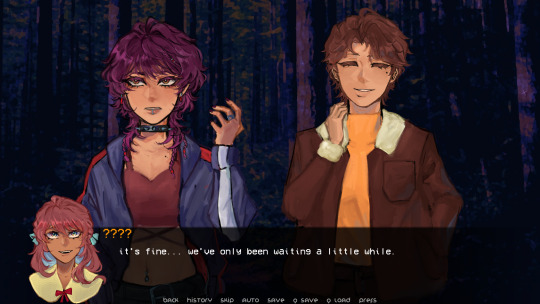
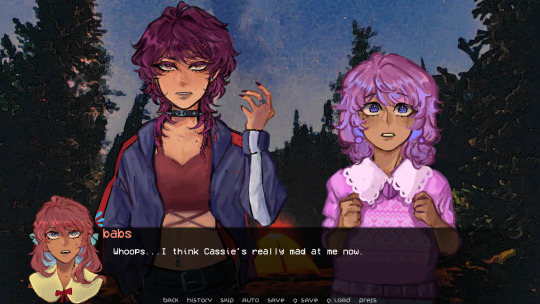
Most of the work is figuring out how to use renpy, which is new to me, or write dialogue, which I'm not too great at.
I'm also trying my best to develop the characters through dialogue/ interaction alone, while not being too overt and in-your-face storytelling wise.
It's a little tricky to find a balance and still characterize them as unique individuals.
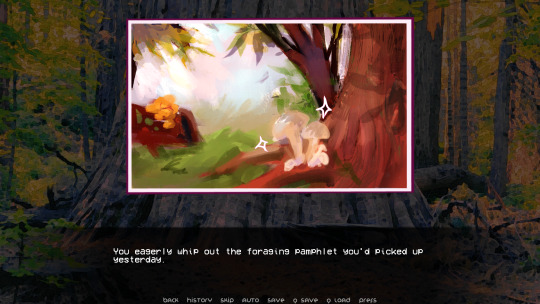

This week i've been working on sound effects, dialogue and little mini-cgs? pop-ups like this one. Plus, i've finally figured out how to make the album navigation + ending menu work. (it's my first time using python)
I've also been working on sprite transitions for a more emotive feel.
Honestly, I've been taking way too long on this project as it is, so I at least make would like to make more progress on the CGs soon...
I've already toned down the scale of the CGs to make completion more plausible/realistic, so I'll see how it goes?

↑ harper's free-time hangout.
#my art#game dev#renpy visual novel#my ocs#indie horror game#indie horror#visual novel#horror visual novel#campaway#renpy#im so tired i worked on this for six hours straight right after class
8 notes
·
View notes
Text

Hi y'all!

I'm always down for asks! Though I make no promises to have all the answers. I'm pretty sociable so feel free to interact!
I don't really intend to frequently post NSFW, but if I do, I'll always community tag cover it. Please see Tags of Note below for more details on what you may want to mute..
I've also got an alt where I do most of my reblogs so this page can stay clean: @civilotterneerredlines
I've also got a Bluesky that I mainly just repost some of my art on: @civilotterneer.bsky.social
I am doing my best to keep my FurAffinity account updated, but it's also the main place I'll store Not-Safe-For-Tumblr art:
https://www.furaffinity.net/user/civilotterneer/
Master list of my larger projects can be found at the end of this blurb.
Wanna know more?
Master List:
Laundry Day - Funny lewd comic about CIv doing laundry
The Search for Civ - Civ has gone missing, how will Lye find him?
Civ Plays: Baldur's Gate 3
Tags of Note:
#Civil Otterneer - I use this to tag all posts I make.
#uncivilotterneer - horny posting, and NSFW. This blanket terms all directly lewd posts, but may not catch stuff considered only 'spicy' as per the speedo tag below.
#speedo - posts where characters are shirtless or wearing very little, like a Speedo, typically not with sexual intent, but stuff may be a bit spicy.
#Civ or #Civ OC: Civ - Civ! My main fursona and primary character
#Lye or #Civ OC: Lye- Civ's friend and housemate, a cat necromancer (The Nekomancer, lol)
#Livic or #Civ OC: Livic - Civ's devilish copy and roommate, a devilish otter
#Civ OC: Xaphar: Xaph - Civ's old friend and romantic interest, a blue dragon
#The Otterneer-verse: Lore and malarkey about the world Civ and his friends live in
#The Reality Room - comics involving Civ and a magical virtual reality device
#ask - posts with asks from people
Fun facts:
I am a practicing civil engineer-in-training. I originally got a degree in environmental engineering, but civil speaks to me more now (they're very similar degrees so it's in fact possible to switch post-college). I'm focusing my work in wastewater and water treatment, with a healthy amount of site grading and water/sewer pipe networks for the city.
I swim just about every day I can, which is pretty close to daily. Thus my fursona's an otter to reflect that. Plus I'm just a silly little guy sometimes.
Ich lerne Deutsch, aber Ich bin nicht sehr gut.
I enjoy tabletop games a ton. Big fan of DND/Starfinder and I'm currently running a Starfinder campaign. I also play a bit of MTG, but more often I play Star Wars Armada, which I paint and homebrew for.
I have 2 3D printers, one FDM and one Resin. I'm typically printing game pieces for Armada, which a roommate and I are currently using to make a Star Trek, UNSC, and Covenant faction for the game. I also 3D print mini's for DND, and my roommate group paints them. The FDM is the favorite child, though its older so maybe that's unfair. (I'd like to note that she's now in her rebellious stage and tends to malfunction more now. The resin's now the grade A student)
I've got two pets: one's my mutt Lady (she's a rez mutt with mixed aussie, german shep, sheep dog, herder, and about every other breed on the rez), the other's my snake Striker (lesser morph ball python).
Base model originally by https://x.com/GalileoGB?t=A570ht3M6JPpeOog-Rn3Kg&s=09
49 notes
·
View notes
Text
Mini Python Study

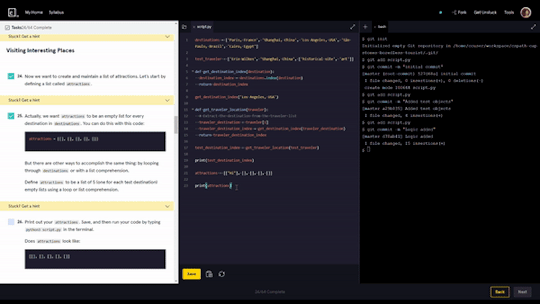
Saturday 5th August 2023
It’s Saturday and I’m already dreading to go into work on Monday, like help! 😖💔
Anyhoo, as I’m in like a state where I don’t want to do anything, that including work, but I’m not giving up so I did 30 mins of Python study on Codeacedemy. Just working with Python lists, functions and Git commands like git init and git add etc 💻
It’s not much but to put me back into the groove of things. Another idea I had was to back to old unfinished projects and essentially complete them! Well, at least try…! ✨
I hope everyone’s doing okay! Seeing some new people in the codeblr community and posting which is awesome! Hi hello welcome! And thanks to the people who helped give advice about burnouts and how to get out of them! 🤗💗
#xc: studies#coding#codeblr#progblr#programming#studyblr#studying#comp sci#computer science#programmer
73 notes
·
View notes
Text
On one hand, I hate my robotics teacher for teaching us the same lesson on python loops we've been learning for half the damn school year, then expecting us to make an innovative robot in 3 weeks when arduino is based on C++.
I was gonna counter that with something else, but as I wrote it I realized just how stupid it actually is. Fuck it. Venting time.
NO CUZ I CAN'T UNDERSTAND THIS GUY. WDYM "Programming's easy! You learn the basics, and from there you make your own solutions." ??? That's not verbatim but. STILL.
I'll give him a bit of credit, he taught us the basics of arduino. The proper syntax, loops, variables, functions, motor control, sensors, etc. But for god's sake, that limited pool of knowledge can only get you enough to make a mini car! It would've been nice to learn about fading LEDs, integer overflow, pointers vs the actual value in a variable, OR EVEN WHAT DOCUMENTATION IS. YEAH. DOCUMENTATION. THE LITERAL OFFICIAL EXPLANATION FOR KEY FEATURES IN PROGRAMMING LANGUAGES.
But suddenly its OUR fault our code doesn't work because "I taught you the basics. If you don't understand, that means you're not listening during my classes." MAYBE IF YOU STOPPED TEACHING US WHAT A FUCKING FOR LOOP IS, WE'D HAVE A REASON TO LISTEN. Majority of my understanding of robotics are a product of self study and receiving help from my family and their long list of IT contacts.
Not only that, HE is the one that approves of our robotics projects. If YOUR students can't complete the project YOU personally approved of, isn't that an error on your part? You should know what your students are capable of making. You should know because they should only know WHAT YOU TEACH THEM. So surprise surprise when your students feel like they're forced to hire people to do their projects, all because of your failure to teach them the skills they needed to do it themselves.
The only people getting a passing grade in this class are gonna be those that are either rich or have a lot of contacts. What a fucking joke.
And don't be mistaken, this is NOT the complaint of someone who doesn't understand programming. I consistently get 90% and above on his exams and do coding for fun. I'm complaining on behalf of my classmates who weren't as lucky as me, in that I have way more people to ask help from.
"100% working by this week" my ass. Actually teach us something relevant for once.
#dumb ramblings#vent post#ough#for the record i do like coding in python#i prefer it over C++ actually#But none of our projects use python#so I don't know what's going on in my teacher's head...
4 notes
·
View notes
Text
Free AI Tools
Artificial Intelligence (AI) has revolutionized the way we work, learn, and create. With an ever-growing number of tools, it’s now easier than ever to integrate AI into your personal and professional life without spending a dime. Below, we’ll explore some of the best free AI tools across various categories, helping you boost productivity, enhance creativity, and automate mundane tasks.
Wanna know about free ai tools
1. Content Creation Tools
ChatGPT (OpenAI)
One of the most popular AI chatbots, ChatGPT, offers a free plan that allows users to generate ideas, write content, answer questions, and more. Its user-friendly interface makes it accessible for beginners and professionals alike.
Best For:
Writing articles, emails, and brainstorming ideas.
Limitations:
Free tier usage is capped; may require upgrading for heavy use.
Copy.ai
Copy.ai focuses on helping users craft engaging marketing copy, blog posts, and social media captions.
2. Image Generation Tools
DALL·EOpenAI’s DALL·E can generate stunning, AI-created artwork from text prompts. The free tier allows users to explore creative possibilities, from surreal art to photo-realistic images.
Craiyon (formerly DALL·E Mini)This free AI image generator is great for creating quick, fun illustrations. It’s entirely free but may not match the quality of professional tools.
3. Video Editing and Creation
Runway MLRunway ML offers free tools for video editing, including AI-based background removal, video enhancement, and even text-to-video capabilities.
Pictory.aiTurn scripts or blog posts into short, engaging videos with this free AI-powered tool. Pictory automates video creation, saving time for marketers and educators.
4. Productivity Tools
Notion AINotion's AI integration enhances the already powerful productivity app. It can help generate meeting notes, summarize documents, or draft content directly within your workspace.
Otter.aiOtter.ai is a fantastic tool for transcribing meetings, interviews, or lectures. It offers a free plan that covers up to 300 minutes of transcription monthly.
5. Coding and Data Analysis
GitHub Copilot (Free for Students)GitHub Copilot, powered by OpenAI, assists developers by suggesting code and speeding up development workflows. It’s free for students with GitHub’s education pack.
Google ColabGoogle’s free cloud-based platform for coding supports Python and is perfect for data science projects and machine learning experimentation.
6. Design and Presentation
Canva AICanva’s free tier includes AI-powered tools like Magic Resize and text-to-image generation, making it a top choice for creating professional presentations and graphics.
Beautiful.aiThis AI presentation tool helps users create visually appealing slides effortlessly, ideal for professionals preparing pitch decks or educational slides.
7. AI for Learning
Duolingo AIDuolingo now integrates AI to provide personalized feedback and adaptive lessons for language learners.
Khanmigo (from Khan Academy)This AI-powered tutor helps students with math problems and concepts in an interactive way. While still in limited rollout, it’s free for Khan Academy users.
Why Use Free AI Tools?
Free AI tools are perfect for testing the waters without financial commitments. They’re particularly valuable for:
Conclusion
AI tools are democratizing access to technology, allowing anyone to leverage advanced capabilities at no cost. Whether you’re a writer, designer, developer, or educator, there’s a free AI tool out there for you. Start experimenting today and unlock new possibilities!
4o
5 notes
·
View notes
Text
Project Introduction: Text Based Monopoly Game.
Look I'm just going to be frank with you, I am not the smartest individual, nor do I have much experience programming, but what I do have is the gall, the absolute nerve to believe that I can do anything even with very little experience. Some call it the Dunning-Kruger Effect, I like to call it a gift from the All Mighty.
This led me to idea of making a text based version of monopoly with about 2 hours worth of python tutorials, absolutely no understanding of data structures and algorithms, and the help of chatgpt.
So far I have already implemented:
Adding, removing, and naming player. With a required minimum of 2 players and cap of 6 players.
Allowing players to declare bankruptcy
Added a win state when there is only one player who is not bankrupt.
Display the player number, name, and current funds.
Random dice rolls.
Allowing players to move within 40 spaces.
Display on which numbered space the player is on the board along with the name of the space that they are located.
Player automatically collect $200 when they pass go.
They can also end their turn.
What I need to implement:
Buy properties, selling properties, and collecting rent.
Morgeting properties
Buying houses
Chance and community cards.
Jail
Trading
View Current Properties
There are probably other things that need to be added for the list but for the moment those are the most present things.
My plan for the text based game is two parts. 1. Getting the game to work. 2. Is migrating and reworking the code into a discord bot which allows users to play this text based version of Monopoly their servers.
I hope to have updates coming steadily. My current focus is on implementing properties but right now I have no idea where to start or how to efficiently do it. So it is still very much a work in progress.
In dev updates going forwards I'm going to be calling the project Textopoly, once the game is in a playable state I will be posting the code over on github along with the discord bot once it is finished.
Tumbler is going to function for mini updates on my project, official and more detailed updates will be posted on my main blog (https://voidcatstudios.blogspot.com/) but those aren't coming anytime soon.
If you have read this far... thank you very much. I'm still very much a noob programmer, but your support means the world and I hope that as I get more experience and knowledge I'm able to make and share more awesome projects with people like you.
Alright then, this has gotten quite long, have a great rest of your day!
10 notes
·
View notes
Text
Our “snapshots” are brief, structured case studies that give a taste of the many diverse ways that startups have been trying to grow into community ownership and governance, albeit with mixed results.
The snapshots range from my Colorado neighbors Namaste Solar and Trident bookstore, which converted to employee ownership, to major open-source software projects like Debian and Python, which are mini-democracies accountable to their developers. There is NIO, a Chinese electric car company whose founder set aside a chunk of stock for car-buyers, and Defector Media, a co-op founded by employees who quit their previous job in protest. There are also blockchain-based efforts, like Gitcoin and SongADAO, that have tried to make good on a new technology’s often-betrayed promises for making a more inclusive economy.
I have taken two main lessons from these snapshots so far.
1. There is widespread craving for a better kind of exit—and the creativity to back it up. Entrepreneurs, investors, users, and workers alike are all recognizing the need for a new approach, and they are trying lots of different ways to get it. They are relying on old technology and the latest innovations. They are using many different legal structures and techniques for empowering communities. The resourcefulness is pretty astonishing, really.
2. Better exits need to be easier—and this will require structural change. In just about every case, E2C attempts have faced profound challenges. They are often working at the very edge of what the law allows, because many of our laws were written to serve profit-seeking investors, not communities. Much of what communities wanted was simply not possible. Truly changing the landscape of exits will mean policy change that takes communities seriously as sources of innovation and accountability.
I want to stress this second point. It first became clear to me when working with collaborators at Zebras Unite on the idea of turning Meetup into a user-owned cooperative. The founder wanted it. The business model made perfect sense—a rare platform whose users actually pay for it. The company was up for a fire sale. But we simply could not find investors or lenders prepared to back a deal like that. This is a problem I have seen with many other co-op efforts, over and over. Policy is the most powerful shaping force for where capital can aggregate, and there is no adequate policy to support capital for large-scale community ownership. This is also the reason we have lost many community-owned companies in recent years, from New Belgium Brewing to Mountain Equipment Co-op—the most successful community-owned companies too often can’t access the capital they need to flourish.
#community-owned startups#community as exit strategy#solarpunk#solarpunk business model#startups#solarpunk business
3 notes
·
View notes
Text
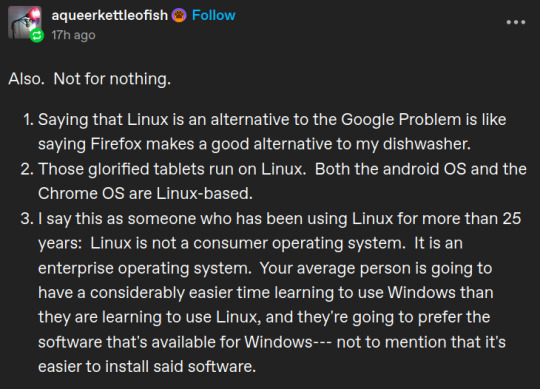
I don't want to reply to this on the post it's on, because it'd be getting pretty far away from the original point (that being that chromebooks have actively eroded the technological literacy of large proportions of young people, especially in the US), but I felt enough of a need to respond to these points to make my own post.
Point 1 is... pretty much correct in the context that it's replying to; the Google Problem in this case being the societal impact of Google as a company and how their corporate decisions have shaped the current technological landscape (again, especially in the US). I'd argue it's less like saying Firefox is a good alternative for your dishwasher and more like saying Firefox is a solution for climate change, but whatever, the point's the same. You can't personal choices your way out of systemic issues.
Point 2 is only correct in the most pedantic way; we both know that 'running on a Linux kernel' isn't what we mean when we talk about Linux systems. It's one true definition, but not a functional or useful one. Android and ChromeOS (and to a lesser extent, MacOS, and to an even greater extent, the fucking NES Mini) all share a particular set of characteristics that run counter to the vast majority of FOSS and even Enterprise Linux distributions. Particularly, they're a.) bundled with their hardware, b.) range from mildly annoying to damn near impossible (as well as TOS-breaking) to modify or remove from said hardware, and c.) contain built-in access restrictions that prevent the user from running arbitrary Linux programs. I would consider these systems to all be Linux-derived, but their design philosophies and end goals are fundamentally different from what we usually mean when we talk about 'a Linux system'. Conflating the two is rhetorically counterproductive when you fucking know what we mean.
Point 3 is a significant pet peeve of mine, and the primary reason why I feel the need to actually respond to this even if only on my own blog. "Linux is not a consumer operating system" is such a common refrain, it's practically a meme; yet, I've never seen someone explain why they think that in a way that wasn't based on a 30-year-old conception of what Linux is and does. If you pick up Linux Mint or Ubuntu or, I don't know, KDE Plasma or something, the learning curve for the vast majority of things the average user needs to do is nearly identical to what it would be on Windows. Office software is the same. Media players is the same. Files and folders is the same. Web browsers is the same. GIMP's a little finicky compared to Photoshop but it also didn't cost you anything and there are further alternatives if you look for them. There are a few differences in terms of interface, but if you're choosing between either one to learn for the first time you're using a computer, the difference isn't that large. Granted, you can also do a bunch of stuff with the command line - you could say the same of Powershell, though, and you don't have to use either for most things. Hell, in some respects Windows has been playing catch-up - the Windows Store post-dates graphical software browsers on Linux by at least a decade, maybe more. Finding and installing programs has, quite literally, never been harder on Linux than on Windows - and only recently has Windows caught up. I used Linux as my daily driver for five years before I ever regularly had to open up the terminal (and even then it was only because I started learning Python). I was also seven when I started. If the average teenager these days has worse computer literacy than little seven year old Cam Cade (who had, let me think, just about none to start with), I think we have bigger issues to worry about.
In my opinion, Linux users saying Linux 'isn't for consumers' is an elitist, condescending attitude that's not reflective of the actual experience of using a Linux system. To say so also devalues and trivializes the work put in to projects like Mint and Ubuntu, which are explicitly intended to be seamlessly usable for the vast majority of day-to-day computer tasks.
3 notes
·
View notes
Text
Raspberry Pi Board: Revolutionizing Computing and Education
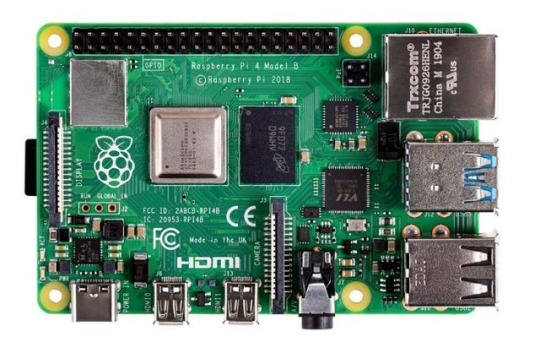
The Raspberry Pi board is a series of small, affordable single-board computers developed by the Raspberry Pi Foundation, a UK-based charity focused on promoting computer science education and digital literacy. Since its launch in 2012, the Raspberry Pi has transformed from a niche educational tool into a versatile platform used in a wide range of applications, from DIY electronics projects to industrial automation.
A Brief History
The first Raspberry Pi, the Model B, was released in February 2012. Designed to promote basic computer science in schools and developing countries, it featured a 700 MHz ARM11 processor, 256 MB of RAM, and basic connectivity options. The success of the Model B led to a rapid expansion of the Raspberry Pi lineup, with various models offering improved performance, more memory, and enhanced connectivity.
Key Features and Models
Raspberry Pi 1 Model B (2012):
Processor: 700 MHz ARM11
Memory: 256 MB RAM
Ports: 2 USB 2.0 ports, HDMI, Composite video, 3.5mm audio jack, Ethernet
Storage: SD card slot
Raspberry Pi 2 Model B (2015):
Processor: 900 MHz quad-core ARM Cortex-A7
Memory: 1 GB RAM
Ports: 4 USB 2.0 ports, HDMI, Composite video, 3.5mm audio jack, Ethernet
Storage: MicroSD card slot
Raspberry Pi 3 Model B (2016):
Processor: 1.2 GHz quad-core ARM Cortex-A53
Memory: 1 GB RAM
Ports: 4 USB 2.0 ports, HDMI, Composite video, 3.5mm audio jack, Ethernet
Wireless: Wi-Fi and Bluetooth
Raspberry Pi 4 Model B (2019):
Processor: 1.5 GHz quad-core ARM Cortex-A72
Memory: Options of 2 GB, 4 GB, and 8 GB RAM
Ports: 2 USB 3.0 ports, 2 USB 2.0 ports, 2 Micro HDMI ports, Ethernet, USB-C for power
Wireless: Wi-Fi and Bluetooth
Raspberry Pi Zero (2015) and Zero W (2017):
Processor: 1 GHz single-core ARM11
Memory: 512 MB RAM
Ports: Mini HDMI, Micro USB OTG, Micro USB for power, GPIO pins
Wireless (Zero W): Wi-Fi and Bluetooth
Applications and Uses
The versatility of the Raspberry Pi has led to its adoption in numerous fields:
Education:
Coding and Programming: Used in schools and educational programs to teach students programming languages such as Python, Scratch, and Java.
Computer Science Concepts: Introduces concepts like hardware, software, and networking.
DIY Projects and Maker Community:
Home Automation: Controls smart home devices, including lights, thermostats, and security systems.
Media Centers: Powers home media centers using software like Kodi.
Retro Gaming: Emulates classic gaming consoles using software like RetroPie.
Industrial and Commercial Applications:
IoT Devices: Serves as a hub for Internet of Things (IoT) devices, enabling data collection and remote control.
Automation and Control Systems: Used in factories and labs for monitoring and controlling equipment.
Research and Development:
Prototyping: Facilitates rapid prototyping of electronic devices and systems.
Data Collection: Gathers data from various sensors in environmental and scientific research.
Community and Ecosystem
The Raspberry Pi has cultivated a vibrant global community of developers, hobbyists, educators, and students. Online forums, tutorials, and community projects provide extensive support and resources for users at all skill levels. The Raspberry Pi Foundation also offers official accessories, including cases, cameras, and expansion boards, further enhancing the functionality of the Raspberry Pi.
Conclusion
The Raspberry Pi board has revolutionized the way people learn about and interact with technology. Its affordability, versatility, and extensive support network have made it an indispensable tool in education, DIY projects, and professional applications. As technology continues to evolve, the Raspberry Pi Foundation remains committed to expanding the capabilities and accessibility of this remarkable platform, ensuring that computing remains within reach for everyone.
3 notes
·
View notes
Text
Best Python Courses in Tirupati
Start your career in programming is one of the best choice had ever taken in your life. Then if you want to work with a strong yet easily learned programming language Python Course would be the one for you. Being among the topmost widely used computer languages in the world, it has applications in various areas like web development, software engineering, data science, automation, AI, etc. If you are from Tirupati and if you wish to learn Python from scratch, then Takeoff Upskill offers the best Python courses in nearby you.
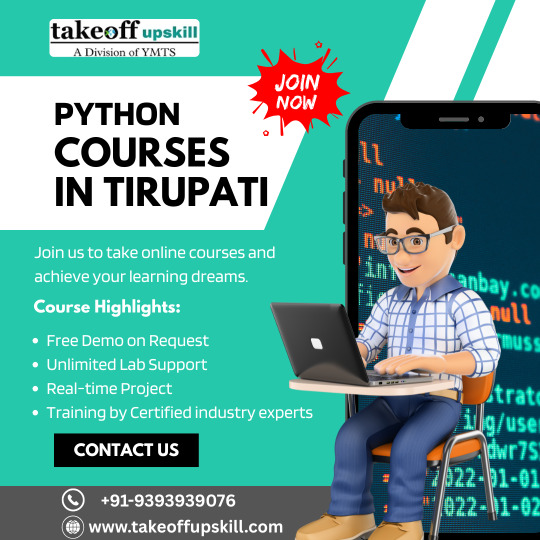
Why Should You Learn Python?
Python is well known and widely used because of its clear and simple syntax. Provided you have no previous knowledge of any kind of programming, you should be capable of learning it all by yourself. It is considered a High-Level language that allows programmers to write clear and easy-to-read code. It is also incredibly flexible hence, you could use it to build websites, create applications, analyze data and automate tasks. Having been used by such big companies as Google, Facebook, YouTube, Instagram, etc. it is one of the best choices for a Data Scientist and a Machine Learning Engineer to get acquainted with. Learning Python will definitely give you many possible jobs in the IT field and further build a strong and successful career.
Why is Takeoff Upskill the Best Choice in Tirupati?
Takeoff Upskill is a trusted and reputed training institute in Tirupati. Among many professional courses it offers, the Python training programs are at the top in demand from students and professionals alike. Our course is for complete beginner, as well as for anyone who feels they want to upgrade their Python skills.
We at Takeoff Upskill take both theory and practical into account. Our belief is that learning the concepts are not enough, you also have to apply them in real-life project work. Hence comes the huge thrust on the hands-on project work so that you walk away with practical knowledge and confidence.
What is covered in Our Python Program?
The Python course is a step-by-step process covering all important topics. You will learn:
Introduction to Python and its features
Installing and setting up Python
Variables, data types and operators
Conditional statements-if, else and elif
Loops (for) and (while)
Functions and modules
Object-oriented programming concepts
Python file handling
Error and exception handling
Working with some of the most popular libraries such as NumPy, Pandas and Matplotlib
Basic techniques for data analysis and automation
Real-time mini projects and assignments
Conclusion:
Learning Python Course is a smart decision for anyone who aims to enter the IT world. It is easy, powerful and highly look for after. If you are in tirupati and want to learn Python from the best institution available, then Takeoff Upskill is the perfect choice for you. Under the guidance of experts, the practical training we have to offer combined with the placement support shall help you land your very own dream job in IT. Enroll at Upskill now and the seed to make your programming career grow will be soon.
1 note
·
View note